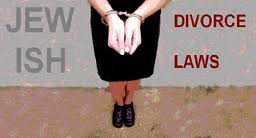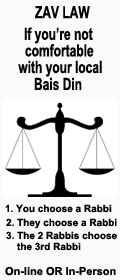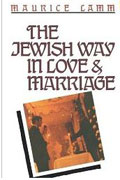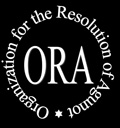
JEWISH BUSINESS HALACHA
PAGE 1
♦♦♦♦♦
I rent an office.
Do I need to put a Mezuzah on the door post & in every room?
- There are two basic opinions on this matter.
- There are those who exempt an office from a Mezuzah since it doesn't serve as a home
(Rashi Sukah 8b) & those who oblige offices nowadays to place a Mezuzah
(Aruch Hashulchan). - In practice he should put it on without a Brachah in all the rooms he uses.
- This applies to Israel & outside.
♦♦♦♦♦
Can I attend a business conference that's held in a non-kosher restaurant?
- In principle it isn't permitted to sit down at a table in a non-kosher restaurant.
- The reason for this, is the problem that it looks like the person is transgressing (maris ayin)
an issur (prohibition) by eating in the non-kosher establishment. - Rav Moshe Feinstein (2:40) writes that when a person is hungry & in a state of discomfort,
it is permitted to eat kosher food in the restaurant on condition that this is done privately in
a way that friends don't see him & that he tells those who do see him that he was in a state
of discomfort. - Shut Minchas Asher (67) goes further & writes that for business meetings there is no
prohibition on entering the restaurant because people understand that business meetings
can be held in non-kosher establishments even when no non-kosher food is eaten. So
there is no reason to assume that the person will be suspected of eating non-kosher food.
He adds that it is also possible that the prohibition of mar'is ayin doesn't apply here because
we don't add circumstances of mar'is ayin that Chazal didn't mention. - This depends on a dispute between the Magen Avraham (463:4) & other authorities
(see Peri Chadash, Yoreh De'ah 87:7, Peri To'ar 9).
- Therefore, if attending the conference is important, either for reasons of earning a living
(parnassah) or for reasons of education, one can be lenient & attend. - However,it remains preferable to avoid entering & sitting in a non-kosher establishment to distance oneself from (mar'is ayin).
♦♦♦♦♦
While pricing computers, a salesman promised to beat any price I found.
I told him a cheaper quote I had received & he agreed to beat it.
When I checked the quote, I realized it was for a cheaper computer.
Do I need to tell the salesman my mistake or can I go with the agreed price?
- It is forbidden to deceive someone (Chulin 94a).
- While you cited a price with honest intentions, nevertheless, money obtained due to an
honest mistake must be returned. - Sellers sometimes try to make a deal look better by suggesting they are giving a discount
when they really aren't. - A certain degree of exaggeration is not unusual in sales transactions.
- But in your case the price was agreed to by being directly linked to a specific quote
on a specific item - The Maharashdam (CM 434) has harsh words regarding an agreement to a certain price
margin where the seller gave the wrong information regarding the cost of supplies.
♦♦♦♦♦
I am a Jewish lawyer in a country with a small Jewish population.
When we need a din Torah, we fly someone in from another country.
A Jew who is suing another Jew asked me to represent him.
The dispute is on a modest amount of money
which is less than the cost of bringing in a beit din.
May we sue in the non-Jewish courts?
- Although we respect & value local government courts (Avot 3:2), Jews are required to
seek adjudication specifically in a Bais Din (shulchan Aruch, Choshen Mishpat 26). - In a city where there is no Jewish Bais Din, the Rama (CM 14:1) says that this is
grounds for going to another city which does have a Jewish Court (Bais Din). - However, most poskim posit that when there is no Bais Din available in the city, it
is permissible to go before a non-Jewish court (Chukos Hachayim (Palagi) 6)
Rivash (216); Shulchan Aruch (CM 61:6). - There is discussion about the conditions under which such action is justified (see
Chukos Hachayim ibid) & on whether a Bais Din must at least grant permission,
even in cases when there is no alternative, before it is permitted to go to the courts. - One should also try to utilize reasonable alternatives
1. Mediation & non-judicial arbitration or selecting a Bais Din locally by means of
a Zavlaw. For this type of Bais Din:
A. 1 person choses a Rabbi,
B. The 2nd person choses a Rabbi
C. The 2 Rabbis pick the 3rd Rabbi
2. With today's technologies there may be a Bais Din or Zavlaw method that will
adjudicate via video conferencing or skype.
♦♦♦♦♦
May a Jewish store owner allow the store to be kept open on shabbas?
- The store may be kept open on Shabbas if the Jewish store owner forms a partnership with
a non-Jew. - Once the partnership is formed, it is still preferable that the non-Jewish partner shouldn't
work in the store on Shabbas.
1. Instead, other non-Jews should be hired to work in the store on Shabbas.
2. Sources: Shulchan Aruch, Mogen Avraham 245:1 & Mishna Brura. (1); Aruch HaShulchan 245:11. - However, the non-Jewish partner may work in the store on Shabbas if the partners can't find
any non-Jewish workers to work in the store on Shabbas.
1. In such a situation, the partners should make an arrangement whereby all the income generated while the store is open on Shabbas should belong to the non-Jewish partner.
2. The partners should then designate one other day of the week for which the income generated that day will belong to the Jewish partner. - The Rema, however, is more lenient & rules that where the Jewish partner doesn't designate
a specific day of the week, the Jewish partner is permitted to share in the income generated
in the store on Shabbas (from the non-Jew's work). Source: Shulchan Aruch 245
♦♦♦♦♦
Can businesses list one price for immediate cash payment
& a higher price for credit or payment in installments?
- This two-tiered pricing is considered a form of rabbinically prohibited interest (ribbis).
- Payment for an item is due upon consummation of the sale & therefore the price charged for immediate cash payment is viewed halachically as the 'true price.'
- Therefore, if the vendor charges more for credit or payment in installments, he is considered
as charging interest for the delay in payment (Y. D. 173:1). - In the absence of a business agreement (heter iska), a customer faced with two-tiered pricing should pay the lower, immediate cash price (Bris Yehuda 22:7-8).
- Some authorities maintain that if the credit price clearly reflects the true price &the cash price
is a discount from the true price, it is allowed (see Chochmas Adam 139:5). - It is permissible to quote a single price factoring in the credit or payment in installments if the price discrepancy is not evident. For example:
1. One may offer an item for 12 installments of $99, even if the item might have been sold otherwise for less, provided that the item does not have a clearly defined value.
2. After the sale is concluded, it is also possible to offer a discount for immediate cash payment (Y.D. 173:3; Rabbi Reisman, The Laws of Ribbis, 6:5-14).
♦♦♦♦♦
A car dealer offers a 10% discount on next year’s model
if payment is made by May 30, four months before delivery.
May I take advantage of this offer?
Pre-payment discounts are often a forbidden form of ribbis;
they are the flip side of buying on credit for an added charge.
- In the prepayment case, the customer advances money to the seller before the purchase is consummated, which is effectively a loan to the seller.
- On account of this prepayment 'loan,' the seller gives the customer a discount, i.e., sells him
an item worth more than he paid. - In our example, because the customer 'lent' the dealer $30,000 for four months, the dealer agreed to sell him a car worth an extra $3,000.
- There are a number of situations, however, in which prepayment discounts are permitted:
1. If the seller currently has sufficient quantities of the item in stock (yesh lo);
2. If the item has no set market value, such as a custom order item;
3. If the merchandise’s worth is variable &may turn out even less than the discounted price, such as buying a farmer’s future crop. - Even in these situations, the seller may not explicitly state that the discount is being offered because of prepayment, but should simply state that this is the price for payment now
(Yoreh De’ah 173:7-9)
♦♦♦♦♦
♦♦♦♦♦
♦♦♦♦♦
Copyright © 2012 -2018 KosherWoman.com
All rights reserved




































